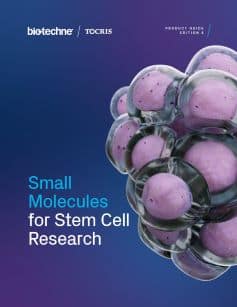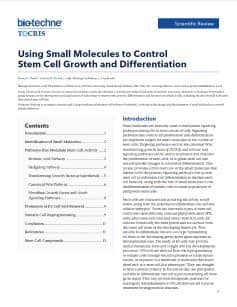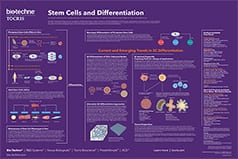Ancillary Material Grade Small Molecules
The Ancillary Material (or AM) Grade range of small molecules has been developed by Tocris for use as ancillary reagents or raw materials in the manufacture of cell therapies. These products are manufactured with additional levels of control compared to our standard catalog (research use only or RUO) product range to ensure the safety of your cell therapy product.
To view Bio-Techne's complete solutions for Cell and Gene Therapy manufacturing, please visit bio-techne.com.
| Cat. No. | Product Name / Activity |
|---|---|
| TB2939-RMU | A 83-01 |
| A 83-01 synthesized to Ancillary Material Grade | |
| TB4055-RMU | L-Ascorbic acid |
| L-Ascorbic acid synthesized to Ancillary Material Grade | |
| TB2634-RMU | DAPT |
| DAPT synthesized to Ancillary Material Grade | |
| TB1126-RMU | Dexamethasone |
| Dexamethasone synthesized to Ancillary Material Grade | |
| TB4703-RMU | DZNep HCl |
| 3-Deazaneplanocin A hydrochloride synthesized to Ancillary Material Grade | |
| TB1099-RMU | Forskolin |
| Forskolin synthesized to Ancillary Material Grade | |
| TB3532-RMU | endo-IWR 1 |
| endo-IWR 1 synthesized to Ancillary Material Grade | |
| TB4106-RMU | Nicotinamide |
| Nicotinamide synthesized to Ancillary Material Grade | |
| TB3742-RMU | RepSox |
| RepSox synthesized to Ancillary Material Grade | |
| TB0695-RMU | Retinoic acid New |
| Retinoic acid synthesized to Ancillary Material Grade | |
| TB1285-RMU | Staurosporine |
| Staurosporine synthesized to Ancillary Material Grade | |
| TB6666-RMU | T3 |
| T3 synthesized to Ancillary Material Grade | |
| TB3222-RMU | TCS JNK 6o |
| TCS JNK 6o synthesized to Ancillary Material Grade |
The Tocris range of Ancillary Material Grade Small Molecules are intended to be utilized as ancillary reagents in the manufacture of cell therapies, for example in regenerative medicine or immune cell therapy. Specifically, they are to be used in the manipulation and culture of cells but are not intended to be present in the final cell therapy product. When developing human cell therapies, patient safety is a major consideration, so there is a need for ancillary reagents (or raw materials) manufactured with a higher level of control compared with standard research reagents used in preclinical studies. This extra level of control is provided by our Ancillary Materials Grade product range.
What Does Ancillary Material Grade Mean?
Tocris' Ancillary Material Grade products are manufactured using a greater number of quality controls and quality assurance measures than Tocris standard catalog products. This ensures that the products are as suitable as possible for the onward manufacture of cell therapies. Our Ancillary Material Grade product range offers an economical and time efficient solution to provide ancillary reagents/raw materials suitable for cell-based therapies transitioning to the clinic, whilst retaining some of the key benefits of cGMP including:
- Animal-free production (Transmissible Spongiform Encephalopathy (TSE) and Bovine Spongiform Encephalopathy (BSE) certification);
- Segregated manufacturing area to reduce cross-contamination risk;
- Enhanced Quality Control testing including bioburden and endotoxin of final products;
- Raw material traceability.
Ancillary Material Grade Quality Attributes

Figure 1: A comparison of standard catalog (RUO) with Ancillary Material Grade products. Each block represents a stage in the manufacturing process, control measure or guidelines followed to assure the quality of the final product; the size of the bar represents the relative time expended.
For more information see GMP and Ancillary Materials Grade Small Molecules.
Regenerative Medicine
Regenerative medicine is the repair or replacement of damaged or diseased tissue to restore normal tissue function. The reprogramming of a patient's somatic cells to induced pluripotent stem cells (iPSCs) and their subsequent differentiation into specific cell types allows for implantation of autologous cells for tissue repair. Alternatively, human iPSC lines derived from peripheral blood cells of an HLA (human leukocyte antigen)-matched healthy volunteer may be obtained from a cell bank and used for allogeneic transplantation. Cord blood-derived embryonic stem (ES) cells may also be used for this purpose. The directed differentiation of cells for regenerative medicine may be achieved by using reagents, such as small molecules, growth factors and cardiac repair, type 1 diabetes and neurodegenerative disorders, such as Parkinson's and Alzheimer's diseases. Our Ancillary Material Grade small molecules are highly suitable for the manufacture of this type of cell therapy for regenerative medicine, and have been developed to assist in transitioning cell therapies from preclinical research to the clinic.
Immune Cell Therapy
Immune cell therapy has recently emerged as a form of immunotherapy and involves collecting a patient's immune cells, manipulating and expanding them ex vivo, then transfusing them back into the patient; this is also known as adoptive cell transfer (ACT). Chimeric Antigen Receptor modified T cell therapy, or CAR-T, is a form of immune cell therapy that has received regulatory approval for the treatment of hematological malignancies in patients. It involves the engineering of donor-derived T cells to express multivalent CARs on the cell surface, which recognize tumor-associated antigens. The introduction of the CAR genes into the patients' cells can be achieved by viral transfer or CRISPR/Cas9 gene editing. Small molecule viral transduction enhancers or CRISPR Reagents may be used to improve the efficiency of the genetic modification process.
The introduction of chimeric antigen receptors into natural killer (NK) cells (CAR-NK) is also being investigated as an approach for the treatment of hematological and solid tumors, as well as HIV immunotherapy. NK cells can be derived from multiple sources, including induced pluripotent stem cells (iPSCs), enabling allogeneic NK cell transplantation, which rarely induces graft versus host disease (GvHD).
How Can We Help With Your Cell Therapy Project?
Are you developing stem cell or gene therapies? We'd love to hear how small molecules can help you. Enquire about our AM-grade production queue.
Related Product From Bio-Techne
Literature for Ancillary Material Grade Small Molecules
Tocris offers the following scientific literature for Ancillary Material Grade Small Molecules to showcase our products. We invite you to request* your copy today!
*Please note that Tocris will only send literature to established scientific business / institute addresses.
Stem Cells Scientific Review
Written by Kirsty E. Clarke, Victoria B. Christie, Andy Whiting and Stefan A. Przyborski, this review provides an overview of the use of small molecules in the control of stem cell growth and differentiation. Key signaling pathways are highlighted, and the regulation of ES cell self-renewal and somatic cell reprogramming is discussed. Compounds available from Tocris are listed.
Stem Cell Workflow Poster
Stem cells have potential as a source of cells and tissues for research and treatment of disease. This poster summarizes some key protocols demonstrating the use of small molecules across the stem cell workflow, from reprogramming, through self-renewal, storage and differentiation to verification. Advantages of using small molecules are also highlighted.



